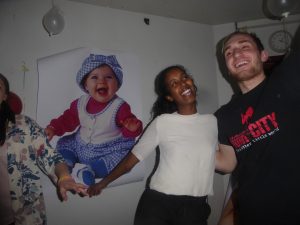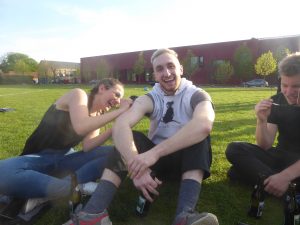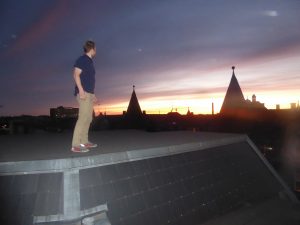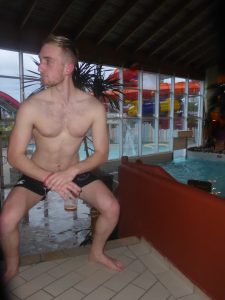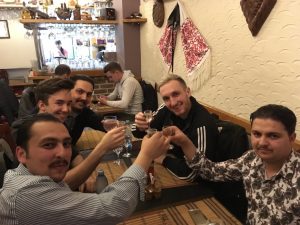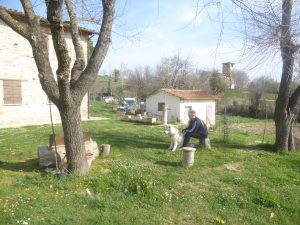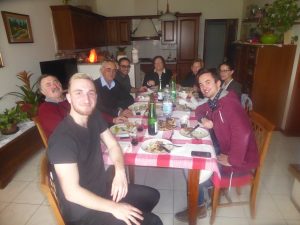Dwayne has been back stateside for a few weeks. His research in Walla Walla is well underway, his certified nursing assistant class begins in a few weeks, and the weight of senior year responsibilities is beginning to weigh heavily on his conscience. Even his silver dyed hair is almost fully grown out to it’s original brown hair, leaving glorious frosted tips in it’s wake. The time has come for me to officially close the curtain on my time in Denmark so that I can turn my gaze fully towards the future. There is no better way to reflect on these past four months than through a final bog post.
Dwayne, Quwini and Baby
My last few weeks in Denmark were undoubtedly some of the best of my life. It was during this time that I realized my newly formed relationships in my kollegium and my rugby team were beginning to strengthen and deepen. I began to feel like an integral cog in these systems and not just a temporary visitor. I know that I had left a deep impression on these people, my departure would be felt for some time, and I would be remembered. This is an achievement that I hope to pursue during every stage of my life, and it is not something that is easy to achieve. It requires genuine human interaction, compassion and vulnerability. It cannot be purchased, and one does not need to travel halfway around the globe to find it. This being said, there is something romantic about making these sorts of connections with the sorts of people that you will only be able to see again after years have passed.
All smiles after Dwayne’s final CBS Rugby game
Academically, I’ve achieved a deeper gratitude and understanding for the subjects that I’ve gained a budding passion for during my time at Whitman. My course in human health and disease introduced me to the mindset of a physician, the intricacies of human pathology, and a real perspective into just how strenuous a life in medicine really is. Meanwhile, my course in European documentary filmmaking further revealed my love for narrative storytelling, key differences between American and European documentary, and my inexperience as a documentarian.
Dr. Dwayne
As a double major in biology and film and media studies, I was hoping that one of my interests in medicine and documentary would become more important to me than the other. As a result, I would know where to focus my academic interest and time. Instead, I’ve learned that these two subjects intricately compliment each other in ways that my words haven’t been able to do justice to yet. Suffice it to say, I feel that being a physician will make me a better filmmaker, and vice versa. To my surprise (and perhaps yours), pursuing a career in either of these fields is very scary to me, and for very different reasons. In film, I’m scared that I lack any real experience, that I will be demotivated by a lack of financial and temporal structure/progess, and that I will search for immediate validation when there will often be none. In medicine, I’m scared that I will not be able to reach the towering academic threshold, that I will be thrust into monumental debt with no escape, and that I may be forced to eschew my other interests and friends. Trying to actively pursue both (within somewhat localized means) seems almost ludicrous. Fortunately, there is nothing that Dwayne loves more than a ludicrous idea.
To conclude this blog, there is one crucial question that must be answered. If you happen to see me or want to contact me, what do you call me; Devin or Dwayne? The short answer is that I respond to both, so it doesn’t really matter much to me. The fact is most people at Whitman know me as Devin already, so there isn’t much point in going by Dwayne unironically. If anything, by calling me Dwayne you acknowledge that you have read my blog or seen my instagram, which is a sort of nice validation revealing that you know something about my current outlook, headspace and personality.
What is the future of Dwayne, you may ask? There is no doubt that here will return in full force during my next major trip. Although I certainly haven’t made any plans yet, Asia is shouting Dwayne’s name, and he desperately wants to answer her call. Ideally, he’ll be able to implement a project focused on old age and documentary filmmaking, expanding on the work he has done in Denmark (shoutout to the Watson Fellowship?). In any event, he’ll definitely be hanging out with old people and making movies somewhere in the world. I hope that you have enjoyed reading these blogs as much as I have enjoyed writing them.
Love, Dwayne
